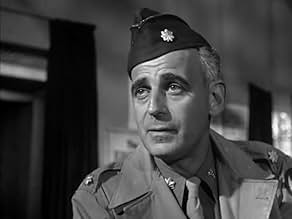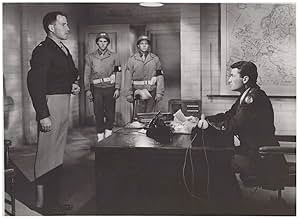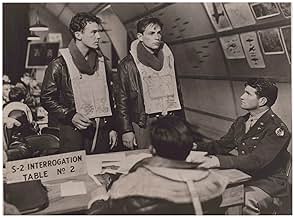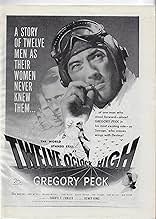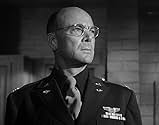Un general estricto se hace cargo de una unidad de bombarderos que sufre de baja moral y la pone en forma de combate.Un general estricto se hace cargo de una unidad de bombarderos que sufre de baja moral y la pone en forma de combate.Un general estricto se hace cargo de una unidad de bombarderos que sufre de baja moral y la pone en forma de combate.
- Dirección
- Guionistas
- Elenco
- Ganó 2 premios Óscar
- 9 premios ganados y 5 nominaciones en total
- Lt. Bishop
- (as Bob Patten)
- Lt. Zimmerman
- (as Lee Mac Gregor)
- Officer
- (sin créditos)
- Radio Operator
- (sin créditos)
- Clerk in Antique Shop
- (sin créditos)
- Operations Officer
- (sin créditos)
- Mr. Britton
- (sin créditos)
- RAF Officer
- (sin créditos)
Opiniones destacadas
Gregory Peck as Brigadier General Frank Savage did great credit to this role, and deserved an Oscar. From the moment he enters the base and tears into the guard at the gate for casually waving him through, you know he's going to be a S.O.B. Dean Jagger as Major Stovall, the lawyer in uniform now Ground Executive Officer knows how to handle the paperwork after the first sobering face to face encounter with with Savage. That Jagger won the Oscar as best supporting actor, was well deserved indeed. Gary Merrill as Colonel Keith Davenport, the too popular Group CO, very good. Hugh Marlowe as Lt Colonel Ben Gately, who flew too many missions from behind a desk, placed on the rack by Savage with the other bomb group deadbeats and foul ups, handles his role well. Then their's Millard Mitchell as Major General Pritchard, displaying a commanding presence, and Paul Stewart as Doc Kaiser, also well portrayed.
There are no false heroics in this movie. No blood and guts all over the silver screen. And no routine world war two, hard boiled, go-get-'em dialogue to spoil it. The authors, Sy Bartlett and Beirne Lay. wrote an excellent screenplay. They did the film a favour, they deleted General Savage's love interest that appeared in their fine novel. I don't think it would have added anything to the movie at all. Maybe what surprised a lot of moviegoers who had not read the book before seeing the movie, was Savage's mental breakdown; freezing suddenly at the hatch as he attempted to heave himself aboard the B-17. It was so unexpected of him after showing such ice-cold nerves
What rounded out this impressive movie was the insertion of the air combat footage shot over Europe during the actual daylight operations. This documentary footage crowned a very fine achievement. One of Henry King's best; a professional effort indeed. The thread of sincerity in this war movie runs deep.
The reason I found the movie so engrossing was, as a teenager, on the sidelines of the war, I saw more than one B-17 stagger home and belly in on a wing and a prayer. This movie was loaded with integrity from the beginning to the end credits. I'm sure the gallant gentlemen who flew with the Eighth Air Force over enemy-occupied Europe would be of the same opinion. It is a kind of monument to those warriors.
I have to subtract 1 star for the overindulgence in team spirit. Otherwise this is a great film, because it has an idea, almost as if it's a training film for officers. The action is almost contrived in order to make the points about leadership. And yet, that is exactly what makes it so compelling. This is a man's job, not a boy's. The job of the brigadier is the hardest in the service. There is no time off. You are close enough to the front to be directly involved, so that you feel the personal weight of your command decisions.
The casting here is just fantastic. These are men! It is refreshing to see men of honor doing their duty, not out of some macho bravado, but because someone has to do a nasty, hard job. Macho is for boys. Duty is for men. I particularly liked Dean Jagger. He and Peck played extremely well together. It is great to watch them interact.
The flying sequences are also remarkable. I got to crawl around in a B-17 once. I'm the same size as my Dad, and it was a tight fit. With 10 guys in there, it would be some crowd. You get that feeling from the film. And then there's the crowd of the formation. They got that right as well. These scenes have lost nothing and are still gripping, 70 years later. The expert technical advice the film makers received really shows up.
I think my favorite character is Sergeant/Private McIlhinny. I sort of see my Dad in him. There are a lot of memorable characters in this film. I can't recommend it enough, biased or not!
¿Sabías que…?
- TriviaThis film is used by the US Navy as an example of leadership styles in its Leadership and Management Training School. The Air Force's College for Enlisted Professional Military Education also uses it as an education aid in its NCO academies and Officer Training School. It is also used as a teaching tool for leadership at the Army Command and General Staff College and for leadership training in civilian seminars. It is used at the Harvard Business School as a case study in how to effect change in organizations.
- ErroresSavage is given command of the 918th and tells Pritchard that he'll get there "early" the next day. By the time he does arrive, Lt. Zimmerman has committed suicide, been given a funeral and Major Stovall has had time to get drunk afterwards.
- Citas
Major Stovall: That is not why I am drunk tonight. I got drunk because I am confused. I was thinking, which is a thing a man should not do, and all at once I couldn't remember what any of them looked like. I, I couldn't see their faces, Bishop, Cobb, Wilson, Zimmy, all of them. All of you. They all looked alike, just one face. And it was very young. It confused me. I think I shall stay drunk until I'm not confused anymore.
- Créditos curiososOpening credits prologue: LONDON 1949
- ConexionesEdited into All This and World War II (1976)
- Bandas sonorasDon't Sit Under the Apple Tree
(uncredited)
Music by Sam H. Stept
Lyrics by Charles Tobias and Lew Brown
Sung at the officers' club
Selecciones populares
- How long is Twelve O'Clock High?Con tecnología de Alexa
Detalles
Taquilla
- Total a nivel mundial
- USD 4,499
- Tiempo de ejecución
- 2h 12min(132 min)
- Color
- Relación de aspecto
- 1.37 : 1



